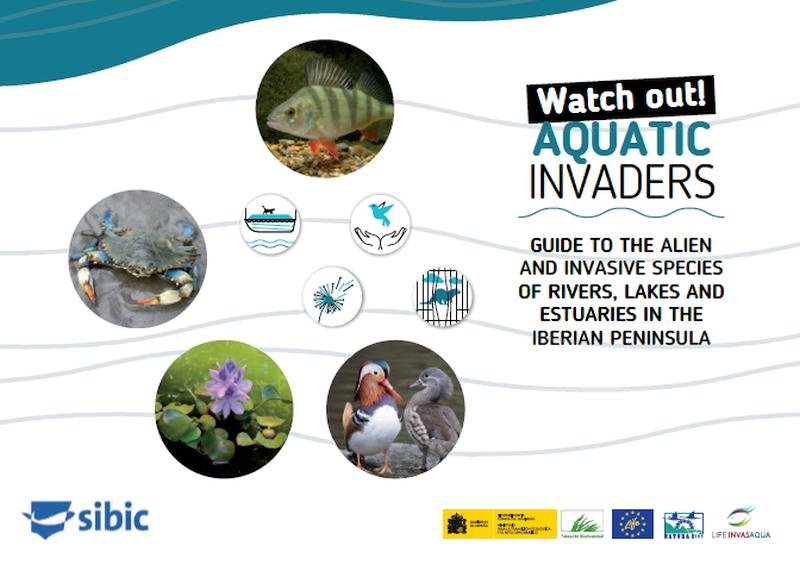Increasing in population sizes and going about their invasive business un noticed for many years, introduced and invasive species in Spain have now become more researched in recent years and the damage they do to local ecosystems is impossible to deny or disprove.
A pioneering and informative guide addresses the problem of invasive alien species (IAS) in a simple and visual format to help society identify them and advance their knowledge, monitoring and management.
The contents of the guide, designed in Portuguese, Spanish and English, include texts, photographs of the species divided into four groups – fungi, invertebrates, fish and other vertebrates.
GUIDE TO DE ALIEN AND INVASIVE SPECIES OF RIVERS, LAKES AND ESTUARIES IN THE IBERIAN PENÍNSULA
Casals, F. and Sánchez-González, J. R. (Eds.). 2020. Guide to the alien and invasivespecies of rivers, lakes and estuaries in the Iberian Peninsula. LIFE INVASAQUAProject. Ed. Iberian Society of Ichthyology. 128 pp.
Download the ebook here: https://www.lifeinvasaqua.com/en/an-iberian-guide-to-identify-and-combat-biological-invasions/
Below is the invasive species list contained in the guide
Fungi, Algae and plants
- Water hyacinth (Eichhornia crassipes)
- Green sea fingers (Codium fragile subsp. fragile)
- Chytrid frog fungus. Quitridio (Batrachochytrium dendrobatidis)
- Didymo. Rock snot (Didymosphenia geminata)
- African payal (Salvinia molesta)
- Asian gracilaria (Agarophyton vermiculophyllum)
- Fairy moss (Azolla filiculoides)
- Harpoon weed (Asparagopsis armata)
- Alligator-weed (Alternanthera philoxeroides)
- Least duckweed. Dinky duckweed. Minute duckweed. Minuscule duckweed (Lemna minuta)
- Leafy elodea (Egeria densa)
- Oyster thief. Bladder weed (Colpomenia peregrina)
- Western waterweed. Nuttall’s waterweed (Elodea nuttallii)
- Water primrose (Ludwigia grandiflora)
- Parrot feather (Myriophyllum aquaticum)
- Water lettuce (Pistia stratiotes)
- Floating fern. Watermoss. Salvina (Salvinia natans)
- Unknown (Womersleyella setacea)
- Golden nutsedge (Cyperus eragrostis)
- Japanese wireweed (Sargassum muticum)
- Banana water lily (Nymphaea mexicana)
- African elodea. South African oxygen weed. Curly waterweed. Oxygen weed (Lagarosiphon major)
- Canadian pondweed (Elodea canadensis)
- Floating pennywort (Hydrocotyle ranunculoides)
- Swamp stonecrop. New Zealand pigmyweed (Crassula helmsi)
Invertebrates
- Tiger mosquito (Aedes albopictus)
- Zebra mussel (Dreissena polymorpha)
- Red swamp crawfish. Red swamp crayfish. Louisiana crawfish. Louisiana crayfish. Mudbug (Procambarus clarkii)
- Signal crayfish (Pacifastacus leniusculus)
- Asian clam (Corbicula fluminea)
- Chinese mitten crab. Shanghai hairy crab (Eriocheir sinensis)
- Apple snail. Golden apple snail (Pomacea spp.)
- New Zealand mudsnail (Potamopyrgus antipodarum)
- American limpet. Atlantic slippersnail. Slipper limpet (Crepidula fornicata)
- Blue crab. Atlantic blue crab (Callinectes sapidus)
- Spinycheek crayfish (Orconectes limosus)
- Freshwater jellyfish (Craspedacusta sowerbii)
- Dark false mussel (Mytilopsis leucophaeata)
- Tadpole snail. Bladder snail (Physella acuta)
- Northern river crangonyctid (Crangonyx pseudogracilis)
- Black-pygmy mussel (Xenostrobus securis)
- Harris mud crab (Rhithropanopeus harrisii)
- Yabby (Cherax destructor)
- Fragile ancylid (Ferrissia californica)
- Brown planaria (Girardia tigrina)
- Freshwater bryozoan (Pectinatella magnifica)
- European fouling hydroid. Ponto-Caspian hydroid (Cordylophora caspia)
- American ribbed fluke snail (Pseudosuccinea columella)
Fish
- European catfish. Wels catfish. Sheatfish (Silurus glanis)
- Common carp (Cyprinus carpio)
- Large-mouth bass (Micropterus salmoides)
- Northern pike (Esox lucius)
- Bleak. Common bleak (Alburnus alburnus)
- Rainbow trout (Oncorhynchus mykiss)
- Eastern mosquitofish. Gambusia (Gambusia holbrooki)
- Topmouth gudgeon. Stone moroko (Pseudorasbora parva)
- Pumpkinseed (Lepomis gibbosus)
- Pikeperch (Sander lucioperca)
- European perch. River perch. Perch (Perca fluviatilis)
- Black bullhead (Ameiurus melas)
- Roach (Rutilus rutilus)
- Rudd (Scardinius erythrophthalmus)
- Goldfish (Carassius auratus)
- Common bream. Freshwater bream. Bream (Abramis brama)
- Chameleon cichlid (Australoheros facetus)
- Mummichog (Fundulus heteroclitus)
- Brook charr (Salvelinus fontinalis)
- Channel catfish (Ictalurus punctatus)
- Stone loach (Barbatula barbatula)
- Danube salmon. Huchen (Hucho hucho)
- Italian spined loach (Cobitis bilineata)
- Asian weather loach. Oriental weather loach. Pond loach (Misgurnus anguillicaudatus)
- Guppy (Poecilia reticulata)
Other vertebrates
- American bullfrog (Lithobates catesbeianus)
- Coypu (Myocastor coypus)
- American mink (Neovison vison)
- Common muskrat (Ondatra zibethicus)
- Raccoon (Procyon lotor)
- Mute swan (Cygnus olor)
- Yellow-bellied slider turtle (Trachemys scripta)
- Ruddy duck (Oxyura jamaicensis)
- Cane toad (Rhinella marina)
- Painted frog (Discoglossus pictus)
- African clawed frog (Xenopus laevis)
- Painted turtle. Painted turtle (Chrysemys picta)
- Peninsula cooter turtle (Pseudemys peninsularis)
- African sacred ibis (Threskiornis aethiopicus)
- Egyptian goose (Alopochen aegyptiaca)
- False map turtle. Mississippi map turtle (Graptemys pseudogeographica)
- Snapping turtle (Chelydra serpentina)
- Chinese stripe-necked turtle (Mauremys sinensis) Chinese pond turtle.
- Chinese three-keeled pond turtle (M. reevesii)
- Raccoon dog. Mangut. Tanuki (Nyctereutes procyonoides)
- Mandarin duck (Aix galericulata)
- Canada goose (Branta canadensis)
- Northern banded newt (Ommatotriton ophryticus)
- Mauritanian toad (Sclerophrys mauritanica)
- Water frogs. True frogs (Pelophylax kl. grafi)
- Asian soft-shelled turtle (Pelodiscus sinensis)
Iberia Nature Forum
Struggling with identifying those bugs and beasties? Why not check out the Iberia nature Forum!
Discover the Iberia Nature Forum – Environment, geography, nature, landscape, climate, culture, history, rural tourism and travel.
I’ve been living in this lovely area of Western Andalucia for the last 20 years or so and dedicate most of my time to the running of English language tourist information websites for the towns of Cádiz, Ronda, Grazalema, the famous or infamous Caminito del Rey, and also Wildside Holidays, which promotes sustainable and eco-friendly businesses running wildlife and walking holidays in Spain. My articles contain affiliate links that will help you reserve a hotel, bus, train or activity in the area. You don’t pay more, but by using them you do support this website. Thankyou!
